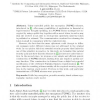283 search results - page 7 / 57 » Bi-Deniable Public-Key Encryption |
121
click to vote
ASIACRYPT
2009
Springer
15 years 4 months ago
2009
Springer
Abstract. Public-key encryption schemes rely for their IND-CPA security on per-message fresh randomness. In practice, randomness may be of poor quality for a variety of reasons, le...
116
click to vote
IJNSEC
2008
15 years 1 months ago
2008
Certificateless public key cryptography was introduced to overcome the key escrow limitation of the identity-based cryptography. Recently, Yum1 and Lee have proposed a generic ser...
ISPEC
2005
Springer
15 years 7 months ago
2005
Springer
Token-controlled public key encryption (TCPKE) schemes, introduced in [1], offer many possibilities of application in financial or legal scenarios. Roughly speaking, in a TCPKE s...
166
click to vote
ASIACRYPT
2008
Springer
15 years 3 months ago
2008
Springer
Recently Cash, Kiltz, and Shoup [20] showed a variant of the Cramer-Shoup (CS) public key encryption (PKE) scheme [21] whose chosen-ciphertext (CCA) security relies on the computa...
128
Voted
PKC
2010
Springer
15 years 3 months ago
2010
Springer
ded abstract of this paper appears in 13th International Conference on Practice and Theory in Public Key Cryptography (PKC) 2010, Lecture Notes in Computer Science Vol. ?, P. Nguye...



